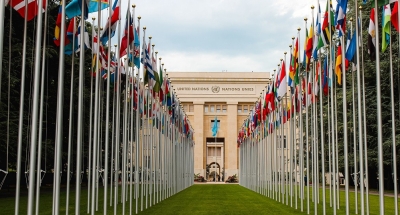WEBINAR: This webinar explores how to measure and communicate your organization's social impact with proven frameworks and strategies that matter to stakeholders.
Company’s blueprint for sustainability gets results—but couldn’t be achieved alone

Partnerships are key to creating systemic impact. Moving the needle on longstanding structural issues requires not just effort from a single organization, but coordinated coalitions that stretch across industries, nonprofits, governments, and even competitors.
A ready-made blueprint for cross-sector partnerships that address big global problems is the U.N. Sustainable Development Goals, 17 ambitious global goals that can only be achieved through strategic partnerships among business, governments, and civil society. They recognize that ending poverty and other deprivations must go hand-in-hand with strategies that improve health and education, reduce inequality, and spur economic growth—all while tackling climate change and working to preserve our oceans and forests.
In this article we will look at how one company, Dow, has established and followed through on a strategy based in partnerships and information sharing that embodies the collaborative spirit of the Sustainable Development Goals.
As a materials science company, Dow prides itself on sustainable innovations to deliver high-quality products to its customers. “Dow’s environmental, social, and governance (ESG) strategy reflects how we are putting our purpose into action,” says Jim Fitterling, Dow’s chairman and CEO. “Every day, our Team Dow colleagues seek new and better answers to transform our world, while also making us stronger and more resilient. After all, we simply cannot thrive as a business if our colleagues, our communities, and our planet do not thrive.”
Placing the utmost importance on transparency in ESG reporting, Dow is committed to the Ten Principles of the United Nations Global Compact and the SDGs. In support of this effort, the company established its Leading the Blueprint goal, a decade-long initiative to cultivate a societal mindset shift on the value and necessity of incorporating diverse perspectives and collaborations to address global challenges. Now more than halfway through this process, the company has created and implemented a Blueprint Thinking Toolkit in partnership with the Keystone Policy Center. Originally conceived as a resource to aid Dow employees in navigating external engagement and collaborations, the company is sharing the toolkit more broadly as a roadmap for anyone to develop a more collaborative mindset and organize stakeholders to solve common issues and create shared value.
Dow’s team members have adopted this partnership expertise in a number of SDG areas, which has resulted in impactful initiatives. For example, aware that conventional cotton fabric dyeing uses trillions of liters of water and there was an opportunity to improve on existing technology, Dow innovated ECOFAST™ Pure Sustainable Textile Treatment. This product enables up to 90% fewer chemicals, 60% lower carbon footprint, 50% less water, and 40% less energy in the cotton dyeing process. In March 2021, Ralph Lauren launched Color on Demand, a multi-phased platform with an ambition to deliver the world’s first scalable zero wastewater cotton dyeing system. Dow and Ralph Lauren have worked hand-in-hand to implement ECOFAST Pure with existing dyeing equipment as phase one of Color on Demand. In October 2021, the two companies released a step-by-step manual on how to dye cotton with ECOFAST Pure and accelerate adoption of a more sustainable process.
“As fashion supply chains look to recover from impacts of the pandemic, there is a critical window to build more sustainable practices into production processes,” said Mary Draves, chief sustainability officer at Dow. “By collaborating today to scale a less resource intensive dyeing process, we can help address pressing challenges, like climate change and water resiliency, in the long-term.”
Another key collaboration stems from the company’s 10-year relationship with The Nature Conservancy (TNC), in which the entities are working to demonstrate the business case for valuing nature in business decisions. The guiding premise of the unique collaboration is built on the concept that incorporating ecosystem services can lead to better business and conservation outcomes. In addition, TNC helped frame Dow’s 2025 Valuing Nature sustainability goal. As a result of this work, the company is more than halfway toward its target to deliver $1 billion in net present value from projects that deliver both environmental and financial value.
Dow’s commitment to collaboration extends to local communities as well. Through a collaboration with the Peabiru Institute, Dow is working to develop a local cooperative in Breu Branco, Pará, Brazil, to sell the bioactive products from Dow’s preserved areas of the Amazon rainforest and increase family incomes in the community while conserving the rainforest. In addition, Dow collaborated with Natura cosmetics brand, which as the first commercial collaborator of this project will provide technical expertise about sustainable extraction of bioactives to the local cooperative. This strategic sustainability project demonstrated the higher value of forest preservation over deforestation. It is expected to positively impact the lives of up to 150 families in the region.
In a different realm of sustainability, Dow has partnered with other plastic and materials science companies—LyondellBasell and NOVA Chemicals—to establish the Closed Loop Circular Plastics Fund. By investing in recycling technologies, equipment upgrades, and infrastructure solutions, the three companies set a precedent for recovering and repurposing used plastics. The company’s commitment to scale the program across industries is demonstrative of its large ambitions for partnerships that make a difference. Fitterling says, “We urge others, across all sectors of society, to join us and scale the technologies, partnerships and capital needed to build the circular plastics supply chains of the future.”
Related Content
RESEARCH BRIEF - Researchers investigated how ESG activities help or hurt financial performance, using nine years of data from over 1,200 global companies.
RESEARCH BRIEF - Researchers analyzed 4 US energy exchange-traded funds (ETFs) over 15 years, including 2 dirty energy funds tracking fossil fuel companies and 2 clean energy funds tracking renewable energy companies.
RESEARCH BRIEF - Researchers conducted a survey, which measured perceptions of CSR and ethical leadership within the manufacturing and service industries.




